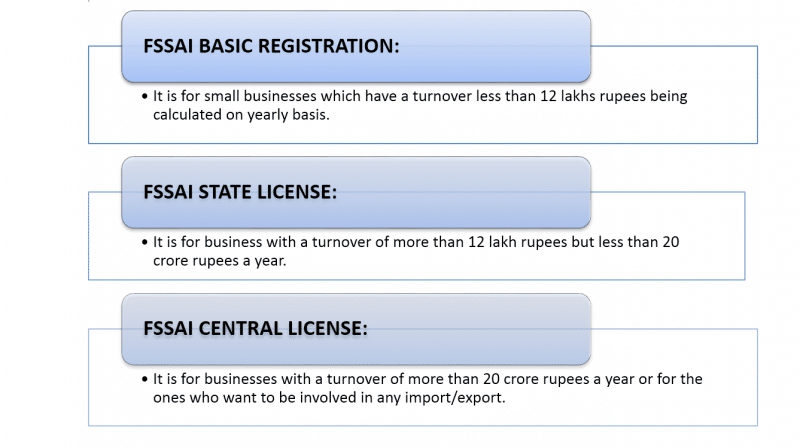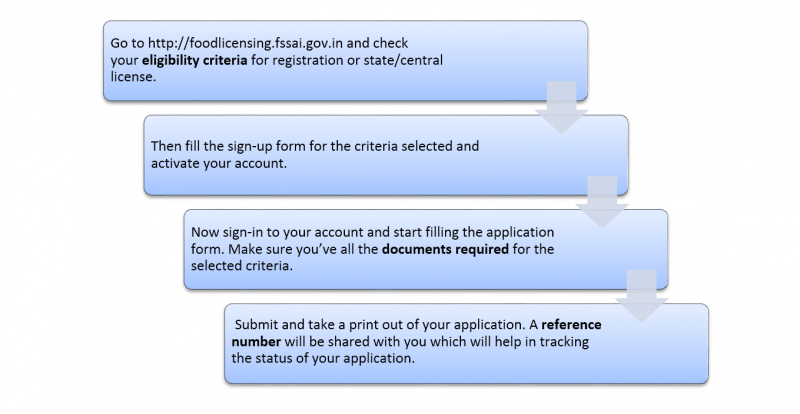Food Safety and Standards Authority of India (FSSAI) is an autonomous body established under the Ministry of Health & Family Welfare, Government of India. The FSSAI has been established under the Food Safety and Standards Act, 2006 which is a consolidating statute related to food safety and regulation in India. FSSAI registration is responsible for protecting and promoting public health through the regulation and supervision of food safety. FSSAI registration ensures safety and quality of food being served. Not only customers but also institution itself are conscious and are taking strict measures to make sure that the food outlets don’t function without one. Below given is some basic information about FASSAI registration, you should be aware of, if you want to register for one.
REGULATORY FRAMEWORK:
The Food Safety and Standards Authority of India is a statutory body under Food Safety and Standards Act, 2006. The Food Safety and Standards Act (FSS), 2006 is the primary law for regulation of food products. This act also sets up the formulation and enforcement of food safety standards in India. The FSSAI appoints food safety authorities on the state level.
The FSSAI registration functions under the administrative control of the Ministry of Health and Family Welfare. The main aim of FSSAI is:
- Lay down science-based standards for articles of food
- To regulate manufacture, storage, distribution, sale and import of food
- To facilitate food safety
STANDARDS:
Standards framed by FSSAI are prescribed under Food Safety and Standards (Food Product Standards and Food Additives) Regulation, 2011, Food Safety and Standards (Packaging and Labelling) Regulation, 2011 and Food Safety and Standards (Contaminants, Toxins, and Residues) Regulations, 2011.
The FSSAI has prescribed standards for following food products:
- Dairy products and analogues;
- Fats, oils and fat emulsions;
- Fruits and vegetable products;
- Cereal and cereal products;
- Meat and meat products;
- Fish and fish products;
- Sweets & confectionery;
- Sweetening agents including honey;
- Salt, spices, condiments and related products;
- Beverages, (other than dairy and fruits & vegetables based);
- Other food product and ingredients;
- Proprietary food;
- Irradiation of food.
The development of standards is a dynamic process based on the latest developments in food science, food consumption pattern, new food products and additives, changes in the processing technology leading to changed specifications, advancements in food analytical methods, and identification of new risks or other regulatory options.
ABOUT FSSAI LICENSE:
FSSAI license registration is necessary for any food related business. It is a 14 digit number that you get. These licenses differ on the basis of the scale of operations being carried out by a business.
Here is the categorisation:

DOCUMENTS REQUIRED:
The documents required for basic registration:
- Form B – completed and signed;
- Photo Identity of FBO;
- Proof of possession of premises (Rental Agreement);
- Partnership Deed / Certificate of Incorporation / Articles of Association;
- List of food products;
- Food safety management system plan.
The documents required for state license:
- Form B duly completed and signed
- Plan of the processing unit showing the dimensions and operation-wise area allocation
- List of Directors/ Partners/ Proprietor with address, contact details, and photo ID
- Name and list of equipment and machinery used with the number and installed capacity
- List of food category to be manufactured
- Authority letter from manufacturer nominated a responsible person name and address
- Analysis report of water to be used in the process to confirm the portability
- Proof of possession of premises
- Partnership deed/ affidavit of proprietorship
- NOC and copy of License from the manufacturer
- Copy of certificate obtained under the Coop Act 1861/Multi state Coop Act 2002
- Food safety management system plan or certificate
The documents required for central license:
- Form- B completed and signed by the Proprietor or Partner or Authorized Signatory.
- Blueprint/layout of the processing unit showing the dimensions and operation-wise area allocation (Mandatory for manufacturing and processing units only).
- List of Directors / Partner / Proprietor / Executive Members of Society / Trust with full 5. Address and contact details (Mandatory for Companies only).
- Name and list of equipment’s and machinery along with the number, installed capacity and horse power used (Mandatory for manufacturing and processing units only).
- Photo identification and address proof issued by the Government for Proprietor / Partner Director(s) / Authorized Signatory (Optional).
- List of food category desired to be manufactured. (For manufactures only).
- Authority letter with name and address of responsible person nominated by the manufacturer along with alternative responsible person indicating the powers vested with them via assisting the officers in inspection, collection of samples, packing and dispatch. (For manufacturers and processors).
- Analysis report (Chemical & Bacteriological) of water to be used as ingredient in food from a recognized / public health laboratory to confirm the portability. (Mandatory for manufacturing and processing units).
- Proof of possession of premises (Sale deed / Rental Agreement / Electricity Bill) (Optional).
- Partnership Deed or Declaration for Proprietorship or MOA & AOA along with Certificate of Incorporation and List of Directors with address. In case of Company, three pages must be uploaded: First Page – Certificate of Incorporation, Second Page – Authorization of food business activity and Third Page – List of Directors with addresses).
- Copy of certificate obtained under Coop Act – 1861 / Multi State Coop Act – 2002 in case of Cooperatives. (If applicable).
- NOC & Copy of License from manufacturer (Mandatory for Relabellers and Repackers).
- Food Safety Management System Plan or Certificate (if any).
- Source of milk or procurement plan for milk including location of milk collection centres in case of milk and milk products processing units. (If applicable).
- Source of raw material for meat and meat processing plants. (If applicable).
- Pesticide residues report of water in case of units manufacturing packaged drinking water, packaged mineral water and/or carbonated water from a recognized / public health laboratory.
- Recall plan wherever applicable, with details on which the product is distributed (optional).
- NOC from Municipality or Local Body (optional).
- Ministry of Commerce Certificate for 100% EOU.
- Supporting documentary proof of turnover.
- NOC/PA documents issued by FSSAI.
- IE Code document issued by DGFT.
- FSSAI Form IX: Nomination of Persons by a Company along with the Board Resolution.
- Certificate provided by Ministry of Tourism (HRACC). (Mandatory for Hotels).
- Documentary proof of turnover or self-declaration of number of vehicles (Mandatory for Transporters).
- FSSAI Declaration Form.
PROCESS TO GET FSSAI LICENSE:
An online application has been introduced by FSSAI called Food Licensing and Registration System (FLRS) below given are the steps to apply for a license:

After you receive your application, the authorities will carry out inspection. After being fully satisfied they will forward the report and then the license will be issued by the authority. This process takes minimum of 60 days.
FEE FOR FSSAI LICENSE:
To know about the updated fees, please contact registration arena.
FSSAI Registration
FSSAI State License
FSSAI Central License
FSSAI license/registration is required for all businesses involved in food production, distribution or transportation. Registration Arena will be glad to help you with your concerned license/ registration.







